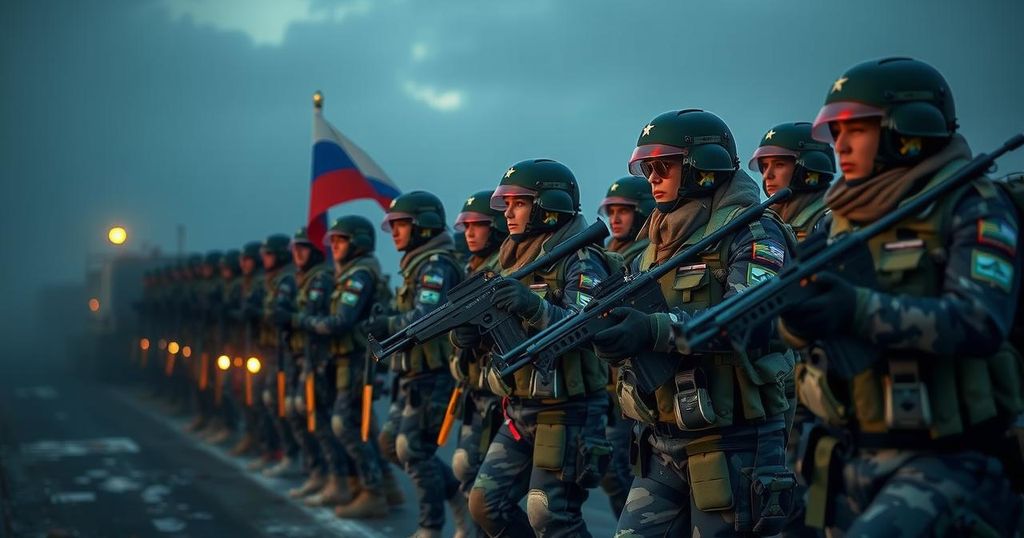Global news
ASIA, BIDEN ADMINISTRATION, CHINA, DEFENCE, DEFENSE MINISTRY, ENERGY INFRASTRUCTURE, EUROPE, EUROPE/ASIA, GEOPOLITICS, INDO - PACIFIC, KIM, KIM JONG UN, KURSK, KYIV, MEXICO, MILITARY, NORTH AMERICA, NORTH KOREA, RUSSIA, SETH GODIN, SOUTH KOREA, UKRAINE, US, VLADIMIR PUTIN, VOA, WAR, WORDPRESS
Isaac Bennett
0 Comments
North Korea’s Troop Deployment to Russia: Implications for Global Conflict Dynamics
North Korea may send troops to assist Russia in Ukraine as part of an evolving alliance. Ukraine’s ambassador has estimated a rotation of North Korean soldiers, raising concerns among Kyiv’s allies. The military partnership signifies a wider conflict’s global nature and potential impacts on eastern geopolitical stability, particularly in relation to China.
Recent discussions indicate the possibility of North Korea dispatching troops to support Russia in its ongoing conflict with Ukraine. Analysts have suggested that while such plans are not yet imminent, the deployment may involve approximately 100,000 troops rotating in increments rather than a single large-scale operation. This assessment follows statements from Ukraine’s ambassador to South Korea, Dmytro Ponomarenko, who projected that as many as 15,000 North Korean soldiers might be deployed periodically in regions around Kursk and potentially in occupied eastern Ukraine as well. The implications of North Korea’s military involvement are concerning for Ukraine’s allies, who fear that this could exacerbate the conflict, marking a new phase in the war that has transformed into a global affair. There are indications that China, led by President Xi Jinping, might be uneasy with this developing partnership between Kim Jong Un and Vladimir Putin, especially as it could impact the geopolitical balance in the Indo-Pacific region and exacerbate tension with the United States. Xi has previously emphasized the importance of stability on the Korean Peninsula while appearing reserved about North Korea’s troop contributions to Russia. Moreover, North Korea’s support for Russia has reportedly included supplies of artillery ammunition and advanced weaponry, indicating a deepening military alliance. The dynamics of this partnership may also pressure China economically as it seeks to navigate international trade amidst threats from the U.S. regarding tariffs. South Korean officials have expressed concerns about North Korea seeking advanced military technologies through this enhanced cooperation. Meanwhile, Ukraine continues to call for Western support, seeking long-range weaponry to counter rising threats stemming from North Korea’s involvement alongside Russian forces.
The relationship between North Korea and Russia has seen significant evolution amidst the backdrop of the ongoing conflict in Ukraine. Analysts have pointed out that potential military cooperation could reshape the conflict’s landscape, leading to broader geopolitical ramifications. The ideas surrounding North Korea’s troop contributions suggest a strategic alignment aimed at bolstering Russia’s capabilities while also seeking enhancements in North Korea’s military technology from its ally. The tensions this relationship introduces are further complicated by the involvement and reactions of other key players, particularly the United States and China.
In summary, the possible deployment of North Korean troops to support Russian efforts in Ukraine represents a significant escalation in the conflict with global implications. As military cooperation deepens, concerns arise regarding the impact on regional security dynamics, particularly in relation to Chinese interests. The development underscores the complexity of modern warfare, where alliances and partnerships can reshape the balance of power, compelling nations to reassess their strategies in the face of evolving geopolitical threats.
Original Source: m.economictimes.com




Post Comment